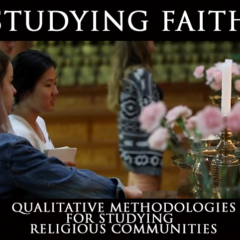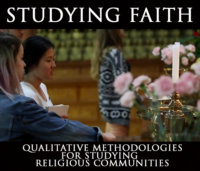Due to the COVID-19 pandemic, in-person social science research is no longer possible. At USC, the Office for the Protection of Research Subjects currently prohibits in-person “community and field-based” research entirely.
It is still possible, however, to research religion from the comfort of your own home. What you learn from virtual research may be different than what you learn from immersing yourself into a space as a participant observer, and it may be more difficult to establish a connection with interview sources, but you can collect interesting, useful data. With all research, check with your University’s Institutional Review Board for approvals on protection of research subjects in your research plans and protocols.
Here are some tips, compiled by CRCC’s researchers and journalist fellows, about how they are making the most of this time and getting as much information as they can virtually.
- Conduct interviews over the phone or an online video service like Zoom.
- When using a video call, you are getting a rare peek into their private space. Do not use a virtual background and ask your interviewee not to do so either. Ask people about things you see on the video—perhaps there are significant pictures on the wall behind them or momentos on their desk. What are they looking at that you can’t see through the camera?
- Ask people to describe where they are, what it looks like, what the air is like, what it smells like even. What is outside their window?
- Arrange to conduct multiple interviews. Zoom fatigue is real, and spacing shorter interviews over several days or a few weeks gives you an opportunity to adapt your questions to what you are learning and for your interviewee to think about what else they would like to share.
- Ask to set up Zoom meetings with your interviewee when they are in different locations (home, office, etc.) to see a different side of your subject.
- One way to “see” interview subjects within their contexts would be to ask them to record a short voice memo describing a particular “scene” or reflecting on an experience immediately after it. For instance, you cannot accompany a chaplain ministering in a hospital on her rounds, but you might be able to understand some of the emotions she feels through a voice memo reflection to you. Your interviewee could also record an in-person conversation with somebody else—a colleague, spouse, child—with the other person’s permission, of course.
- Use “participant observation” by participating in religious services or meetings online. Be sure to ask for consent from the host in advance and be clear about who you are and why you are there with other participants.

